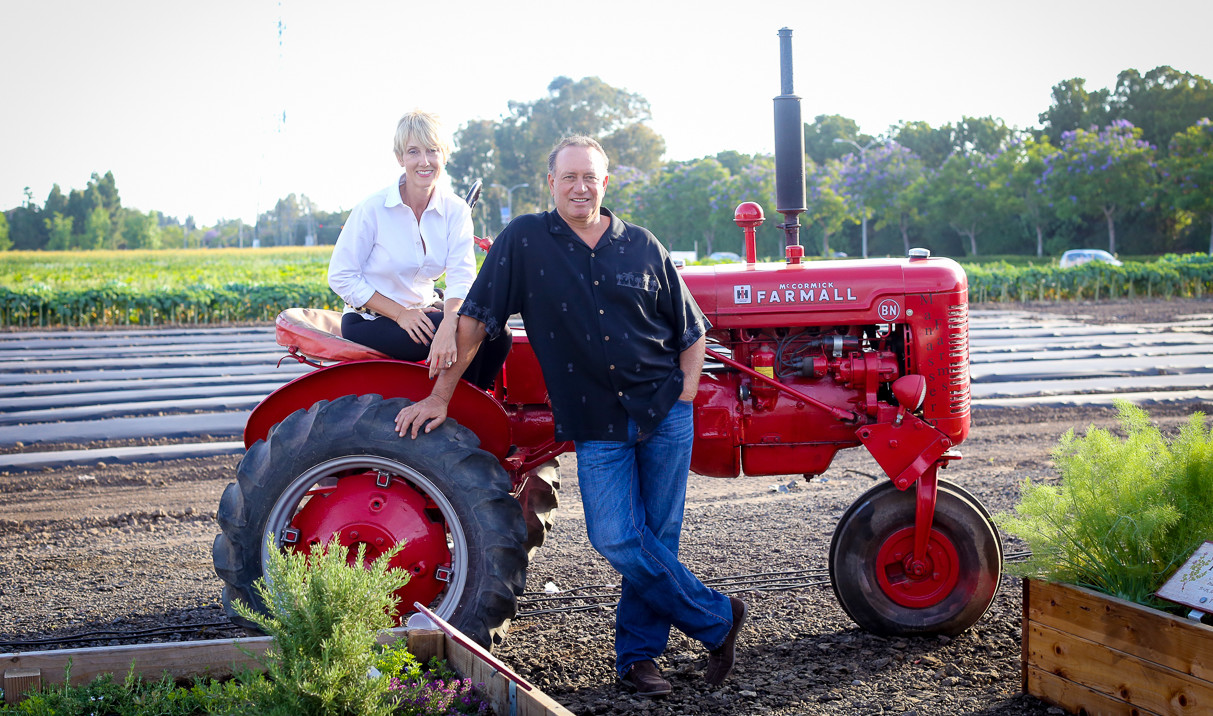As lawmakers gear up to vote on the latest federal farm bill reauthorization in December—which delegates funding for farmers and agricultural and food-based programs across the country—local farmers in California are reflecting on their hardships of staying in business.
The bill, in part, helps support small farmers with increased funding for wastewater infrastructure, labor reform for farm workers—often illegal immigrants—by helping such workers gain legal status, and increased access to financing for startup, small, and mid-sized farms through various programs.
Dan and Anne Manassero, husband and wife co-owners of Manassero Farms in Irvine, Brea, and Tustin, say such help is needed as state and federal regulations surrounding farming practices have made it “incredibly difficult” for smaller businesses such as theirs to stay afloat.
Such regulations affect farmers such as the Manasseros in part by shaping business operation costs such as water, fertilizer, transportation, and other agricultural practices and goods.
The duo say such regulations are squeezing their already “very narrow” profit margin and are doing the same to many other California farmers.
As California continues to lead the country as its top agricultural producer, such regulations are increasing the cost to produce crops, which the Manasseros said contributes to the rising cost of food.
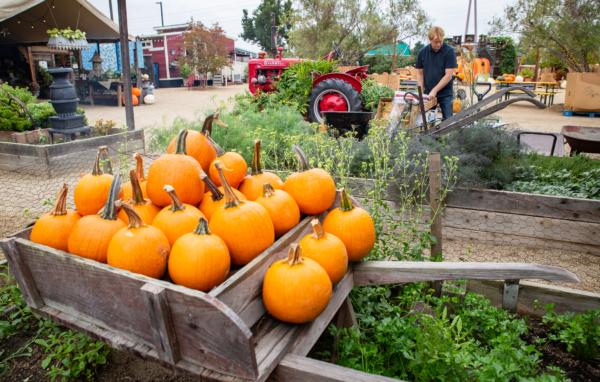
Manassero Farms in Irvine, Calif., on Oct. 7, 2021. (John Fredricks/The Epoch Times)
“The government is just putting a squeeze on [local farmers],” Mr. Manassero told The Epoch Times.
According to the Manasseros, state and federal regulations have made farming more and more costly, resulting in the family cutting back their acreage and focusing more on retail such as hosting bridal showers, business retreats, baby showers, and other events in their barn at their Irvine location to stay in business.
“Thank God we came up with that model, if we hadn’t, we might not have been able to stay open with how expensive [government] regulations have gotten,” Ms. Manassero said.
Such regulations include paying residential rates for water usage instead of the agricultural rates they were once charged, they said. Such a change, instituted five years ago because of drought measures, doubled their water bill, according to Mr. Manassero.
Another financial strain on their bottom line came after the Affordable Care Act, sometimes known as Obamacare, was implemented in 2010, they said.
The Manasseros said they had to lay off workers in order to stay below the 50-employee threshold because they couldn’t afford to pay for employee health insurance on top of other fees such as business taxes, organic certification fees, and more.
“These [lawmakers] just don’t understand how small our profit margin already is, and every time they pass one of these policies, it eats up whatever tiny profit we have left,” Ms. Manassero said.
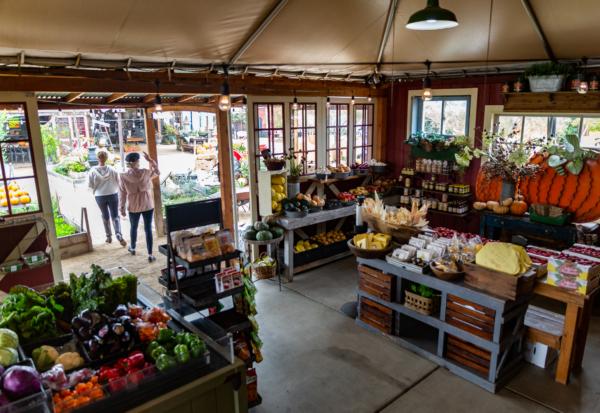
Manassero Farms in Irvine, Calif., on Oct. 7, 2021. (John Fredricks/The Epoch Times)
The Manasseros also said their financial burden is bolstered by increasing competition from Mexican farms, which are able to grow similar crops at a fraction of the cost because they don’t have the regulatory costs associated with farming in California and the United States.
According to Mr. Manassero, California farms pay their workers per hour what Mexican farms pay per day. Such costs make it “nearly impossible” for California farmers to compete.
The Manasseros said many Southern California farmers will instead relocate to Mexico to be competitive.
However, they say such economic pressures on U.S. producers may have deadly consequences by placing countries such as Mexico as the top food producers for the United States.
According to Mr. Manassero, as American farmers continue to be out-competed and Mexico dominates the food market, food insecurity may become a bigger concern because corruption is interwoven with farming across the border.
“The [drug] cartels run everything down there, [including] the farmers. They’re very big into the farming industry for money laundering. ... They would just jack up the prices [of food] to whatever they want once [American] farmers are out of business,” he said.
Another economic pressure facing the Manasseros is the cost of oil, which they say, in turn, is increasing their operational costs such as the purchasing of fruit boxes and other farming supplies.
Making matters worse is California’s gas-powered vehicle ban instituted by California Gov. Gavin Newsom, which would ban the sale of all such vehicles by 2035, according to Mr. Manassero.
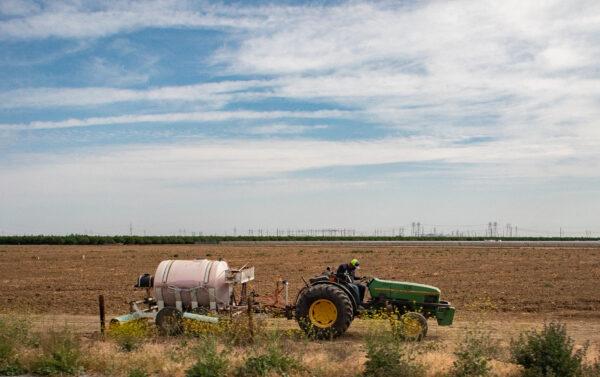
A farmer uses a tractor outside of Sacramento, Calif., on April 18, 2022. (John Fredricks/The Epoch Times)
According to the Manasseros, this policy will skyrocket produce prices as gas-powered trucks will no longer be allowed to transport produce and supplies at competitive rates. And with California gas being taxed higher than the national average, the Manasseros said their production costs have crept even higher, making them even less competitive with larger producers and growers in Mexico.
“[Lawmakers] did not think that one through at all. We can’t possibly have the infrastructure or money to [enact] something like that so soon,” Mr. Manassero said. “It’s a huge way they’re hurting local farmers.”
A.G. Kawamura, who was then-Gov. Arnold Schwarzenegger’s secretary of food and agriculture from 2003 to 2010 and is currently the owner of Irvine-based Orange County Produce farm, repeated many of the same worries as the Manasseros.
Mr. Kawamura said such concerns include labor costs being “too high,” farming moving to and being taken over by Mexico, and regulations increasing operational costs.
“I’m not anti-regulation. I’m anti-over-regulation,” Mr. Kawamura told The Epoch Times. “Farmers have gone from a state of living to a state of survival with how expensive it’s gotten.”
Such regulations, according to Mr. Kawamura, include California’s recent labor laws, which require paying farm workers for daily overtime; which has forced farms to cut back laborer’s hours because of the lack of affordability.
The reason is because working hours on farms are irregular depending on weather conditions, which require laborers to work overtime on some days to make up for the lack of hours during seasonal shifts, he said.
“These kinds of rules, which have good intentions, result in both the farmer and the farm worker suffering,” Mr. Kawamura said.

A.G. Kawamura, secretary of California's Department of Food and Agriculture, testifies at a hearing on Capitol Hill in Washington on July 31, 2008. (Brendan Hoffman/Getty Images)
Orange County Produce, which has been run by Mr. Kawamura’s family since 1946, has also had to adjust to meet the financial burden of remaining operational in California amid pricey regulations by not growing certain crops and reducing acreage.
While his farm remains successful, Mr. Kawamura said he has seen many of his farming peers in Southern California’s Coachella Valley move to Mexico.
According to him, the valley went from having more than 27,000 acres of grape growers and vineyards in the past 50 years down to only 2,000 acres as of this year. He said the migration of farmers will continue to worsen if something doesn’t change.
Mr. Kawamura said less than 2 percent of people in the United States work in agriculture now, with most in the country not even being “engaged” in the process at all.
Such lack of involvement is dangerous, he said.
“That ignorance of where our food comes from, and how vulnerable it is, is one of the greatest threats to the nation and the world really,” Mr. Kawamura said. “This is not just the United States. It’s all over the world where there’s so few people in a position anymore to understand what happens to our food or how it’s produced.”
U.S. Rep. Lou Correa (D-Calif.), whose district spans Santa Ana and Anaheim, is currently in talks with local farmers and nonprofits to gain their input on the Farm Bill reauthorization in hopes of securing adequate funding for those in the state.
“[The Farm Bill] really touches each of us in our daily lives with nutrition, farming, and subsidies,” Mr. Correa said during a recent roundtable discussion on the bill. “We in Congress really want to make sure each of you has a strong voice when it comes to putting together this very important bill.”

U.S. Rep. Lou Correa (D-Calif.) speaks with local residents ahead of the Farm Bill reauthorization roundtable discussion in Anaheim, Calif., on July 6, 2023. (Carol Cassis/The Epoch Times)
The bill’s reauthorization, which happens every five years, is currently underway as lawmakers from across the country deliberate on how and where funding will be allocated for farmers and other food producers, as well as on other regulations within the legislation.
Mr. Correa said during a recent roundtable discussion on the bill that funding and outcomes are now “more important than ever” in light of food shortages that occurred in grocery stores across the country during the COVID-19 lockdowns in 2020 and 2021.
The congressman said seeing the empty store shelves illustrated to him how “dangerous” food insecurity is in California and the United States, despite the nation’s wealth and productivity.
“I still can’t believe that in Orange County, which is the richest county in the richest state of the union in the richest nation in the world, we had empty food shelves in our supermarket. Food still is and will continue to be a critical issue,” Mr. Correa said during the meeting.
He reiterated such statements during a recent interview with The Epoch Times, saying small farmers such as Mr. Kawamura and the Manasseros being hurt economically by competition from Mexico is “very dangerous”
“We need to ensure our self-preservation and make sure that we can grow our own food. We don’t ever want to be embargoed with food like we were embargoed with oil by Saudi Arabia in the 1980s and 90s,” Mr. Correa said. “So I want to make sure that small family-owned farms in the U.S. survive the challenges that are ahead of us, and [Congress] hopes to address [their] challenges for the next five years through this Farm Bill.”
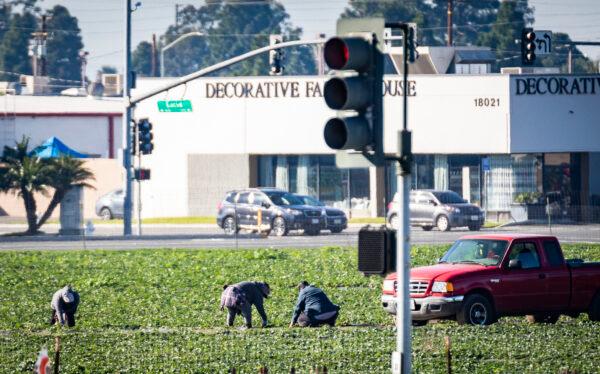
Farm workers tend to strawberries in a field in Fountain Valley, Calif., on Jan. 27, 2022. (John Fredricks/The Epoch Times)
California is the top agricultural producer in the country and supplies more than 20 percent of the nation’s dairy.
According to a spokesperson from Mr. Correa’s office, as well as recent reports by media outlets including Politico, partisan divides within Congress are threatening the $1 trillion Farm Bill reauthorization from moving forward, which may also trigger a government shutdown.
“Some of my colleagues in the house [of Representatives] want to gut the Farm Bill reauthorization to cut down on [SNAP, formerly known as food stamps] and other spending,” Mr. Correa told The Epoch Times. “I would say we have a long way to go [to pass the bill] but get paid to work on these issues. So I’m optimistic, although right now, I think it’s going to be very challenging.”
